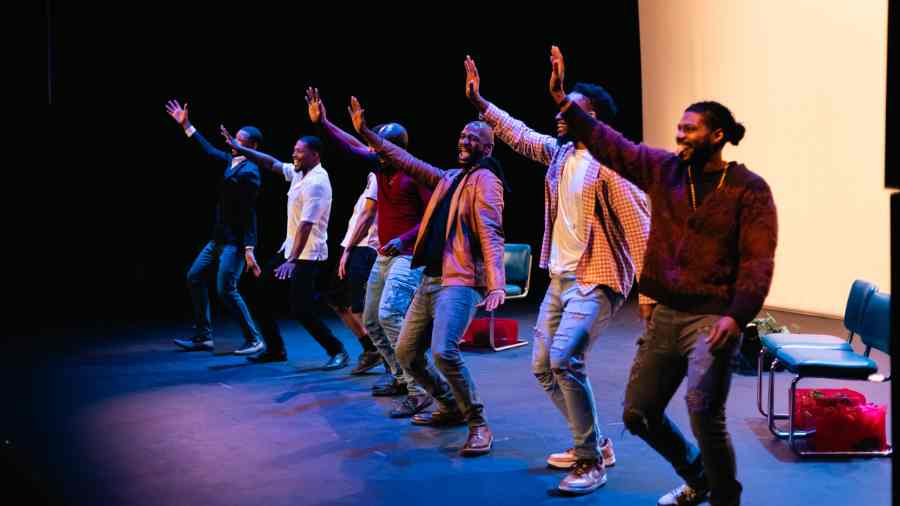The touring play Black Boys Cry, now at the City Lit Theatre, explores the emotional journeys of seven Black men (Photo Credit: 1989 Dreams production).
“Black Boys Cry,” a touring stage play, is at the City Lit Theatre. This compelling and humorous narrative follows the lives of seven Black men navigating their journeys toward experiencing joy.
Addressing themes such as healing from childhood trauma, addiction, and abandonment and exploring aspects of sex and sexuality, these men find solidarity in brotherhood. Their journey is marked by laughter, spirituality and the resilience to embrace life to the fullest.
The tour has traveled across the United States to illuminate Black men’s challenges and promote greater understanding and resolution of these issues.
[perfectpullquote align=”full” bordertop=”false” cite=”” link=”” color=”” class=”” size=””]”It will feel like a family cookout for those coming to the show. There’s a mix of drama, laughter, dancing, and a great time overall—everything you’d experience at a cookout we bring to the stage.” – Actor J Austin[/perfectpullquote]
Director, writer, producer Harold Jay Trotter and cast members “Tipville” and J Austin provided an overview of what audiences can anticipate from the tour. They also emphasized that the play offers women insights into supporting and relating to Black men better.
Actor Tipville said, “Black Boys Cry helps them understand men better and how to interact with us. We must express our emotions; through this play, women can finally grasp what we’ve been trying to communicate all along. It gives them a visual experience that allows them to say, ‘Ah, now I see what they’ve been trying to express.’ That’s something I cherish about this production.”
This play is also about building community and fostering brotherhood—finding those genuine connections where you can be yourself and have meaningful conversations.

“Black Boys Cry” follows the journeys of Black men who navigate joy, trauma, and identity (Credit: 1989 Dreams production).
A supportive community is crucial, whether with teammates, church members, coworkers, close family or friends. It’s about creating safe spaces where men can advocate for one another, free from the pressures of projecting a particular image or living up to expectations.
Harold stated, “The foremost challenge we all face is identity. Throughout our lives, we grapple with defining who we are—whether it’s early expectations to excel in sports or later societal pressures to conform to stereotypes like becoming a rapper.
“Finding our true selves amidst these influences is a common struggle for everyone. However, as Black men, this journey takes on a unique dimension. Secondly, I believe brotherhood is essential. It revolves around communication, building a supportive community, and having trusted individuals with whom we can be vulnerable, authentic and open,” said Harold.
“These two themes—identity and brotherhood—are the key takeaways that resonate deeply with me.”
The group also shared that Black men shouldn’t overlook the benefits of therapy or confiding in a trusted person. Their communities need to understand the challenges they face and support them accordingly.
“One thing I love about the show—though I don’t want to give too much away if you come to see it—is when my character, Magic, seeks therapy,” Tipville said.
“In our community, seeking therapy is often frowned upon, but Magic advocates for it in the play. I used to think therapy was a joke until I tried it myself. It was surprisingly comforting to open up to someone who didn’t know me personally without fear of judgment.”
Tipville added, “This aspect resonates with me. I encourage everyone to see the play because it offers something meaningful. Even though I’ve been in it countless times, I still take away something valuable each time I perform.”
Actor J Austin said that communication is vital and stressed the importance of building community, adding, “That’s the only place where you’ll be able to feel comfortable enough to communicate and open up, but you need to. It’s okay to be open and to communicate.”
Trotter pointed out that despite the title “Black Boys Cry,” the reviews and the message’s impact empower people to focus on self-improvement.
“I want to emphasize that although the title is Black Boys Cry, it’s a hilarious and enjoyable experience. People leave having gone through every emotion imaginable—from sadness and self-reflection to abundant laughter and joy,” he said.
“There’s even a sense of peace when you leave. Last week in Vegas, we invited a Chipotle worker to the show for lunch, but we did not expect him to come. To our surprise, he did, and after the performance, he approached me with tears in his eyes. He said, ‘It was a God thing that you guys invited me. I can’t express it in words, but I needed this.’
Added Trotter, “It’s truly a life-changing show, but I always emphasize how enjoyable and uplifting it is. Some might hear the title and think it’ll be a downer, but it’s quite the opposite.”
For ticket information on “Black Boys Cry,” please visit this link.
